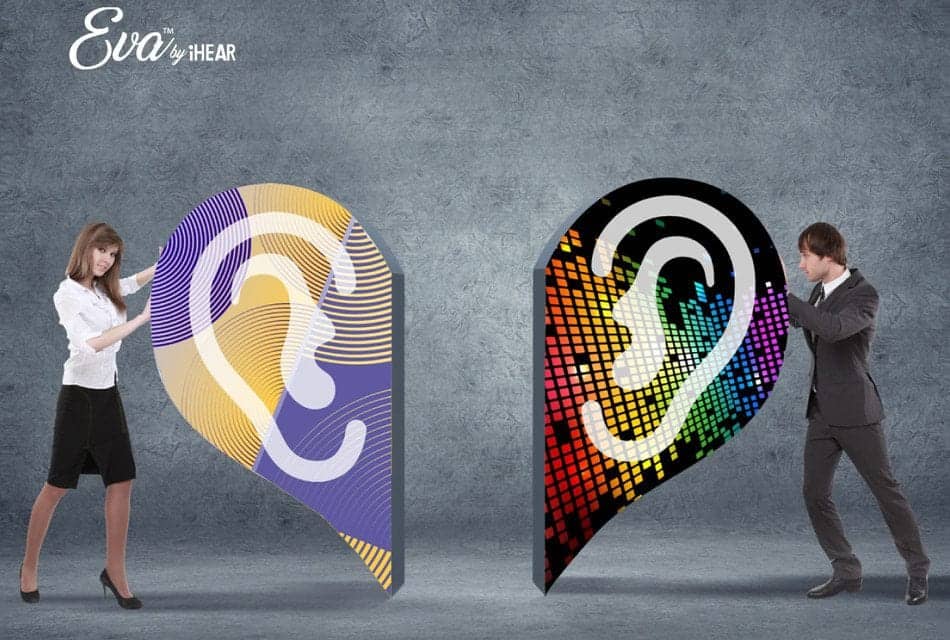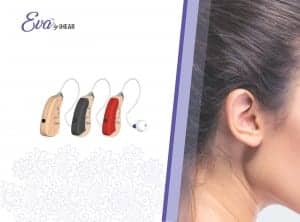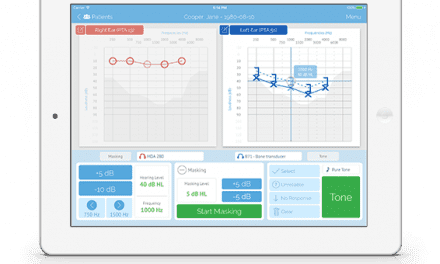iHEAR Medical, San Leandro, Calif, a venture-capital backed firm that specializes in hearing solutions, announced the launch of Eva™, reportedly the first hearing aid designed specifically to address the hearing loss of women.
The company said Eva will be available to order online on July 1, 2017. Orders will ship beginning July 15, 2017.
Gender gap in affordability widens
It is the view of iHEAR Medical that the cost of quality hearing aids has widened the gap in hearing health, with the affluent enjoying clinically-effective hearing solutions while the majority, particularly retired women whose savings are considerably less than those of men, are left without a solution. According to iHEAR Medical, many women simply cannot afford programmable hearing aids available in traditional channels, which currently cost $5,000 or more for a pair. The consequences of untreated hearing loss can be devastating for both men and women, and include lower income, reduced access to healthcare and education, and higher incidence of depression and social isolation.
Women, on average, live longer than men, but their earnings and life savings are generally lower, the company said.
“Introducing Eva as a low-cost solution for women with hearing loss is consistent with iHEAR’s mission to remove barriers for the millions currently denied access to quality hearing care,” said Adnan Shennib, founder & CEO of iHear Medical. The company is developing web-enabled hearing solutions and was founded by Adnan Shennib, who has started and led the development at several Silicon Valley firms, including InSound Medical and the Lyric hearing aid, which was acquired by Sonova-Phonak in 2010. The company also markets the iHearTest, the first FDA-approved hearing test for over-the-counter (OTC) sales, which is based on the World Health Organization (WHO) guidelines, targeting adults who suspect they have hearing loss or those reluctant to seek professional evaluation for a basic hearing assessment.
iHEAR is pioneering cloud-based hearing solutions to deliver high-quality hearing aids directly to consumers at a fraction of the cost of conventional programmable hearing aids, which cost $2,400 per device, on average, according to the company. Eva and other programmable digital hearing aids offered by iHEAR retail online at $299 per device, bringing the cost of advanced hearing aids in line with prescription eyeglasses.
Eva reportedly incorporates advanced features typically offered in hearing aids costing several thousands of dollars, including multi-memory sound profiles, digital noise suppression, and automatic feedback cancellation. The Eva hearing aid also includes a telecoil for wireless audio reception available by most phones and in public venues such as churches and theaters.
For more information on the Eva, visit: http://www.EvaByiHEAR.com/
Men and women have different hearing loss patterns, says iHear
Even when the degree of hearing loss is comparable between men and women, there are characteristic differences in hearing loss patterns that require different treatment, according to iHear. The company states that women tend to lose hearing first in the low frequencies, while men lose hearing mostly in the higher frequencies. Both genders can also experience difficulty hearing speech, especially in noisy conditions. Therefore, said iHEAR Medical, hearing loss treatment should be tailored for the needs of women by understanding these characteristic differences and customizing hearing aids accordingly.
Although many types of hearing loss can be successfully treated with the use of a hearing aid, some common objections to utilizing them include the comfort of wear, cost, and negative stereotypes that depict hearing aids as noisy and ineffective, according to iHEAR Medical.
According to the company, Eva’s sound processing is tailored to treat distinct hearing loss patterns experienced by women. Loud sounds above 85 dB are reduced for a comfortable listening experience in noisy settings, along with independent suppression of annoying ambient noises for a comfortable long-term listening experience. Eva automatically enhances male and female speech, even in challenging listening situations such as noisy restaurants and social gatherings.
Eva addresses women’s unique anatomical and physiological characteristics
Women generally have smaller ears and hearing aids designed for men can reportedly feel bulky and uncomfortable to wear. Eva is miniaturized for inconspicuous wear behind a woman’s ear and is offered with smaller ear accessories to fit more comfortably and in closer proximity to the eardrum for an exceptional hearing experience, said iHEAR Medical. Eva’s low-profile design ensures a secure fit in the ear for maintaining an active lifestyle, including working, exercise, and even swimming. Eva is offered in a slim, compact form factor with an assortment of color options, including beige, red, and grey.
The Eva hearing aid is personalized at home by the consumer using patented online tools, which deliver male and female speech for the tuning process. Eva can also be shipped pre-customized if audiogram results are submitted with an order, or customized online using EarPiNG™, which connects consumers with licensed hearing professionals for remote programming.
Source: iHEAR Medical







This is a total marketing gimmick to cash in on the OTC bandwagon. Hearing loss treatment is catered to a person and their hearing loss, not a gender. Aids specifically designed to fit their needs every time is what we as hearing professionals already do. ALL the products offered now are designed to fit women well already. What this is is simply a way to try to make more money off those needing professional help without less invested in the technology and cashing in on those in need. There are no research papers validating these claims mentioned either.
This sounds fishy. It is not a peer reviewed article, not are there any works cited.
To all that see this review …. PLEASE see an Audiologist for an appropriate diagnosis and recommendation of hearing aid if needed….no data exists that suggests one brand or hearing aid over another for gender alone.
This is ridiculous. An audiologist who fits hearing aids programs them based on an individual’s audiogram and personal preferences. So there is no need for gender-specific hearing aids. And the research stated in the article seems a little dubious anyway. Also, hearing aids already are made in a variety of styles and sizes, many of them smaller than the ‘Eva’, and dome sizes and custom ear molds are appropriate to anyone with smaller ear canals. Buying hearing aids over the Internet is not in the best interest of anyone with a hearing loss. Take care of your health and make an appointment with a professional.
As a doctor of Audiology, I agree. This product is a marketing gimick. Hearing aids are individually optimized by an audiologist and are available in smaller sizes (for men AND women) than this. For the price, the basic features they mention must be very old technology.
The vast majority of the hearing-impaired population cannot afford $5,000 or more every few years to buy hearing aids. Even if iHear is only half as effective as prescription hearing aids, at 1/10 the price it is a huge help to 90% of those with hearing loss.
All the comments above show the panic in the industry that is not concerned about helping everyone, only the well-to-do. They know that rich aren’t stupid, and they will also try a $500 option before they shell out $5,000, and why not?
The traditional brick-and-mortar industry must take heed: OTC is coming. You better get ready to compete, or force the competition out of business through protectionist (protecting business not consumers) government laws and regulations.
As a 53 year old woman who have been wearing the SAME hearing aids that cost me $8000 six years ago, I welcome all new technology and OTC aids. I have small ears and a small ear canal and these hearing aids have never fit in my ears as they were supposed to. If this company is looking for a woman to participate in their hearing aid experiment contact me. I’ll be glad to be a part of the process of introducing affordable hearing aids for women. My health insurance only covers a hearing exam every three years and pays only $1500.00 towards a pair hearing aids.
I’m thrilled this product includes a telecoil! It will give users a way to connect directly to hearing loops (that are finding their way in houses of worship and other facilities around the country) and offer phenomenal speech understanding in those places.
I would love more information about these scientific sources claiming women and men have different hearing loss patterns.